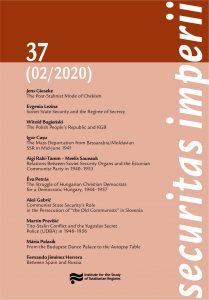Soviet state security and the regime of secrecy: guarding state secrets and political control of industrial enterprises and institutions in the post-Stalin era
Soviet state security and the regime of secrecy: guarding state secrets and political control of industrial enterprises and institutions in the post-Stalin era
Author(s): Evgenia LezinaSubject(s): History of Communism
Published by: Ústav pro studium totalitních režimů
Keywords: Soviet Union; Lithuania; Ukraine; USSR from the 1950s to 1980s; KGB; Secrecy regime; State security agencies in industry; Surveillance; Counterintelligence
Summary/Abstract: Having been entrusted with securing secrets in the early years of Soviet rule, the secret police remained the chief guardian of state secrets and the main driving force behind the regime of secrecy in the USSR until its collapse in 1991. This paper explores the development of the secrecy regime in the Soviet Union from the late 1950s until the late 1980s, focusing on the relevant functions, methods, and practices of regime-secrecy bodies during this period. It also addresses a double function of state security agencies at industrial enterprises and institutions as a secret police conducting counterintelligence servicing and performing surveillance over employees on the one hand, and acting as a guardian and organizer of the secrecy regime on the other. Additionally, it examines the role and implications of the personnel security screening system, which was a part of securing state secrets. This study is largely based on archival sources from the collections of the Lithuanian Special Archives in Vilnius, the archives of the State Security Service of Ukraine in Kyiv, and the Communist Party archives in Moscow.
Journal: Securitas imperii
- Issue Year: 2020
- Issue No: 37
- Page Range: 38-69
- Page Count: 32
- Language: English

